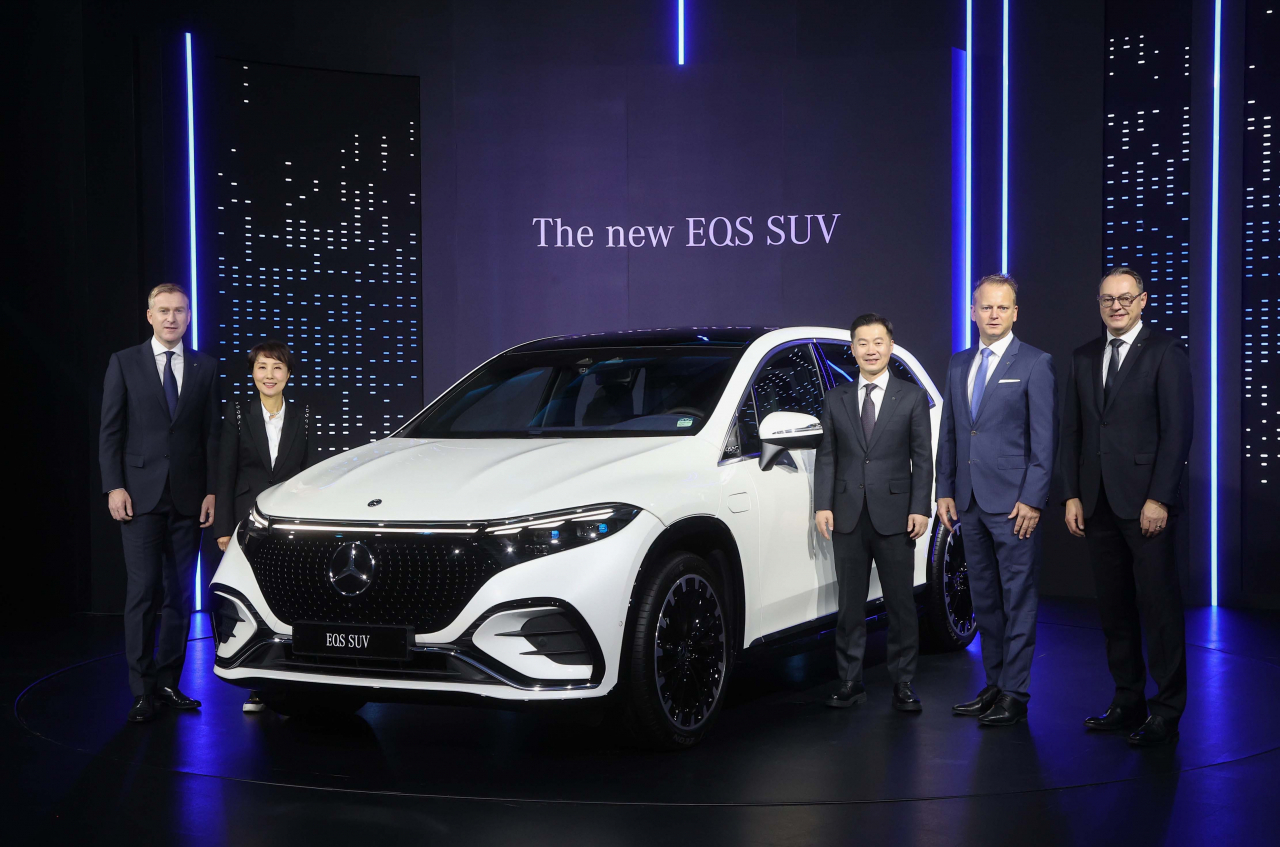 |
(From left) Mercedes-Benz Korea top executives Johannes Schoen, vice president of product, marketing and digital division; Cho Myeong-ah, vice president of network development and training academy division; Lee Sang-kuk, vice president of salesdivision; Thilo Grossmann, vice president of consumer service division; and Stefan Albrecht, vice president of treasury division pose with the new EQS electric SUV during a press conference held at a Seoul hotel on Wednesday. (Mercedes-Benz Korea) |
Mercedes-Benz Korea said Wednesday it will expand electric vehicle models to account for more than 15 percent of total car sales this year, underscoring its green push in the fourth-largest market of the German carmaker.
“Last year, EV sales were less than 10 percent of the total sales. But starting from this year, we will offer more EV lineups (for customers), accelerating shift towards electrification,” said Lee Sang-kuk, vice president of sales department at Mercedes-Benz Korea during a press conference held in Seoul.
Citing electrification as one of the key strategies for 2023, Lee added that Korea is a leading EV market. Last year, the Korean unit’s EV sales jumped threefold compared to a year earlier, outpacing the growth rate of combustible-engine cars.
By 2025, the German carmaker aims to make EVs account for 50 percent of all car models and only sell battery-powered EVs by 2030. It completed its all-EV lineup in 2022.
Stressing luxury as a core identity of the brand, Lee said Korean customers, with their exquisite taste for high-end products, have appreciated Mercedes-Benz. “Our premium car models including the Mercedes-Maybach and the S-Class saw a surge in sales by 17 percent on average in 2022. We will continue to showcase the world’s most desirable cars this year.”
“Also, luxury and sustainability are two inseparable concepts,” said Lee, adding that the Mercedes-Benz Korea Research and Development Center will hire 50 percent more tech talent, who will take the lead in innovative sectors such as self-driving and expand partnerships with automotive technology companies.
With its renewed business strategies, the Korean unit on Tuesday launched the New EQS SUV, the largest and most luxurious EV of Mercedes-Benz. It is the first SUV to be developed based on the carmaker’s EVA2 platform for EVs.
“The new model embodies all three strategies -- luxury, electrification and sustainability,” said Johannes Schoen, vice president of product, marketing and digital business at Mercedes-Benz Korea.
“It will allow for sporty and robust driving performance, powered by 107.1 kilowatt battery storage and maximum of 400 kW, and at the same time offer first class lounge experience (for drivers and passengers) with spacious interior and versatile entertaining.”
By the second half of this year, the carmaker will roll out the second new model, the New EQE SUV. The luxury business EV offers a more practical interior space than EQS SUV and a comfortable driving experience.
The Korean unit will launch two full model changes of the New Mercedes-AMG SL, the seventh generation of the luxury roadster SL, and the New GLC, third generation model of the midsized SUV. Eight facelift models include GLA and GLB SUVs, GLE Coupe and CLA sedan.
When asked about this year’s sales goal, Lee said the company will focus on improving customer service rather than laying out ambitious targets.
“Every week we are reviewing the sales processes of local dealerships through a third party inspection agency,” said Lee, citing an incident from last year in which a company official asked a customer to pay 15 million won ($1,218) to exchange a flooded car that the customer had bought thinking it was new.
“In a move to enhance consumer service, we will expand service network centers rather than building more sales centers,” said Lee.
As for the narrowing sales gap with BMW Korea, Lee argued that a significant gap between the two would come from making a difference in customer experience.
The Korean unit said it aims to boost online sales this year as well. Compared to last year, used car sales online surged by 17.6 percent and new cars sales jumped 5.6 percent. On average, monthly car sales online came to 380 units. Celebrating the 20th anniversary of Mercedes-Benz Korea, it plans to launch online limited edition models on the 20th of every month this year.
Last year, Mercedes-Benz Korea became the first imported car brand here to surpass the 80,000 mark in sales, posting a record high of 80,976 units. It kept its title as the No. 1 foreign car brand here since 2016. Sales of high-end models Mercedes-Maybach S-Class and Mercedes-Maybach GLS skyrocketed by 147 percent and S-Class saw a 13 percent increase in sales from a year earlier.
Mercedes-Benz outpaced BMW’s 65,669 units, turning the tables at the last minute when its rival had almost caught up. In January-November period, BMW posted 71,713 units in sales shaking off Mercedes-Benz, who sold 71,525 units.







![[Today’s K-pop] Blackpink’s Jennie, Lisa invited to Coachella as solo acts](http://res.heraldm.com/phpwas/restmb_idxmake.php?idx=644&simg=/content/image/2024/11/21/20241121050099_0.jpg)